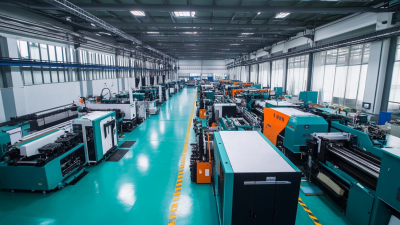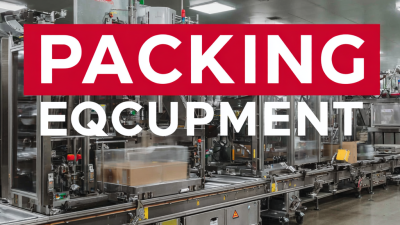ProMach is your partner from start to finish. Our product brands are grouped into distinct business lines that make the most sense to our customers, covering every function of the production line: Filling, Bottling & Capping, Decorative Labeling, Flexibles & Trays, Pharma, Handling & Sterilizing, Labeling & Coding, Robotics & End of Line, and Systems & Integration.
learn moreForm Fill Seal Machines in Different Manufacturing Sectors A Comparative Analysis
The increasing demand for efficient packaging solutions across various manufacturing sectors has propelled the popularity of Form Fill Seal (FFS) machines. According to a report by Grand View Research, the global packaging machinery market is expected to reach USD 56.65 billion by 2025, with FFS technology playing a pivotal role due to its ability to enhance productivity and reduce overall operational costs. FFS machines are instrumental in a diverse range of industries, including food and beverage, pharmaceuticals, and consumer goods, due to their versatility and efficiency in processing and packaging products in a single integrated system. This blog aims to provide a comparative analysis of Form Fill Seal machines across different manufacturing sectors, highlighting their unique features, advantages, and potential limitations that can affect production outcomes. With an emphasis on real-world applications and statistical insights, this exploration will shed light on the critical impact of FFS technology on modern manufacturing practices.

Key Differences in Form Fill Seal Machines Across Packaging Industries
 Form-fill-seal (FFS) machines play a crucial role in various manufacturing sectors, notably in food, pharmaceuticals, and consumer goods packaging. Each industry employs specific types of FFS machines tailored to their unique requirements. For instance, in the food sector, horizontal form-fill-seal machines dominate due to their efficiency in packing products like snacks and ready meals. According to a report by Mordor Intelligence, the food packaging industry is projected to grow at a CAGR of 4.8% from 2022 to 2027, significantly driving the demand for advanced FFS technology.
Form-fill-seal (FFS) machines play a crucial role in various manufacturing sectors, notably in food, pharmaceuticals, and consumer goods packaging. Each industry employs specific types of FFS machines tailored to their unique requirements. For instance, in the food sector, horizontal form-fill-seal machines dominate due to their efficiency in packing products like snacks and ready meals. According to a report by Mordor Intelligence, the food packaging industry is projected to grow at a CAGR of 4.8% from 2022 to 2027, significantly driving the demand for advanced FFS technology.
Conversely, the pharmaceutical industry often utilizes vertical form-fill-seal machines due to stringent regulations and the need for sterile packaging. These machines are designed to accommodate vials, syringes, and other temperature-sensitive items. A recent study by Research and Markets revealed that the global pharmaceutical packaging market is expected to reach $500 billion by 2025, highlighting the critical role of FFS machines in ensuring product integrity and compliance with health regulations.
Tips:
1. When selecting an FFS machine, consider the type of product being packaged and its specific handling requirements to ensure optimal performance.
2. Regular maintenance and updates of FFS equipment can enhance efficiency and prolong the lifespan of the machinery, ultimately leading to cost savings in production.
Impact of Material Types on FFS Machine Performance
The performance of Form Fill Seal (FFS) machines is significantly influenced by the types of materials used in the manufacturing process. Each material presents unique challenges and benefits, impacting the overall efficiency and output quality of the packaging. For instance, flexible films, often used for their lightweight and durability, may require specific adjustments in sealing temperatures and speeds compared to rigid materials. Understanding the properties of your chosen material is crucial for optimizing machine settings and extending operational lifespan.

Tip: Always conduct a trial run with your selected material to identify the ideal temperature and pressure settings for your FFS machine. This can help prevent common issues such as seal failures or material jams during high-speed operations.
Moreover, the choice between biodegradable materials and traditional plastics can further affect FFS machine performance. Biodegradable films, while environmentally friendly, typically require different handling characteristics and may necessitate alterations in the machine's configuration. This not only influences production rates but also impacts the long-term sustainability goals of a manufacturing business.
Tip: Invest in training for operators on handling varying material types. This ensures that they can quickly adapt to the specific requirements of different materials, promoting efficiency and reducing downtime in production cycles.
Efficiency and Speed: A Comparative Study of FFS Systems
Form Fill Seal (FFS) machines have revolutionized packaging processes across various manufacturing sectors, primarily due to their efficiency and speed. A recent report by ResearchAndMarkets indicates that the global FFS machine market is projected to reach $25 billion by 2025, growing at a compound annual growth rate (CAGR) of around 6.5% from 2020. This tremendous growth highlights the rising demand for faster production line solutions that FFS systems can provide. In sectors such as food and beverage, pharmaceuticals, and personal care, where the speed of packaging directly correlates to market competitiveness, FFS machines offer a feasible solution by streamlining the entire packaging process.
In terms of operational efficiency, FFS systems significantly reduce labor costs and minimize material wastage. For instance, a comparative study by Packaged Facts reveals that FFS machines can achieve speeds of up to 300 bags per minute, which is markedly higher than traditional packaging methods. Additionally, the automated nature of FFS technology allows for consistent quality and precision, which is critical in regulated industries like pharmaceuticals. With manufacturers continuously seeking to enhance productivity, the ability of FFS systems to integrate with smart technology and real-time monitoring further enhances their appeal, establishing them as a pivotal element in the future of manufacturing.
Scalability and Flexibility in Various Manufacturing Sectors
In today’s manufacturing landscape, scalability and flexibility are paramount, particularly for form fill seal (FFS) machines.
These machines have evolved to meet the diverse needs of various sectors, including food and beverage, pharmaceuticals, and personal care products.
According to a recent report by MarketsandMarkets, the global FFS packaging market is expected to reach $40.74 billion by 2026, growing at a CAGR of 4.2%. This growth is largely attributed to the increasing demand for efficient packaging solutions that can adapt to different production volumes and product types.
FFS machines are designed to offer manufacturers not only high-speed operation but also the versatility to switch between different packaging formats with minimal downtime. For instance, a study by Grand View Research highlighted that the food and beverage sector alone accounted for over 30% of the market share in 2020, driven by the need for quick changeovers in packaging lines. With advanced technologies like IoT integration and intelligent control systems, modern FFS machines can rapidly scale operations, ensuring that manufacturers can respond effectively to fluctuating consumer demands without sacrificing product quality or operational efficiency.
Cost-Benefit Analysis of FFS Machines in Different Applications
The Cost-Benefit Analysis of Form Fill Seal (FFS) machines across various manufacturing sectors reveals significant insights into their efficiency and economic impact. In the food and beverage industry, FFS machines streamline the packaging process by reducing labor costs and minimizing material waste. By employing these automated solutions, manufacturers can increase production rates while maintaining consistent quality, ultimately leading to higher profit margins.
Similarly, in the pharmaceutical sector, the adoption of FFS machines brings compliance with strict regulatory standards, which is crucial for ensuring product safety. The initial investment in these machines may be substantial; however, the long-term savings on labor and operational costs often outweigh this upfront expenditure. The ability of FFS machines to produce packaging that is not only secure but also customizable adds further value, enhancing brand appeal and customer satisfaction.
In sectors like personal care and household goods, the flexibility of FFS machines allows companies to quickly adapt to market trends and consumer preferences. This adaptability can result in reduced time-to-market for new products, giving businesses a competitive edge. Thus, while the costs associated with FFS machines can vary, their benefits in terms of efficiency, compliance, and market responsiveness make them a worthwhile investment across multiple manufacturing applications.
Related Posts
-

Top 10 Case Packing Equipment Manufacturers from China at the 137th Canton Fair
-

Exploring Sustainable Packaging Equipment Alternatives for Modern Businesses
-

Innovative Approaches to Packaging Machines in 2025 Trends and Eco-Friendly Alternatives
-

Future of Packing Equipment: 2025 Innovations and How to Optimize Your Supply Chain
-

Ultimate Guide to Choosing the Best Packaging Equipment: Insights and Data for Optimal Efficiency
-

Innovative Examples of Best Packing Equipment for Global Buyers